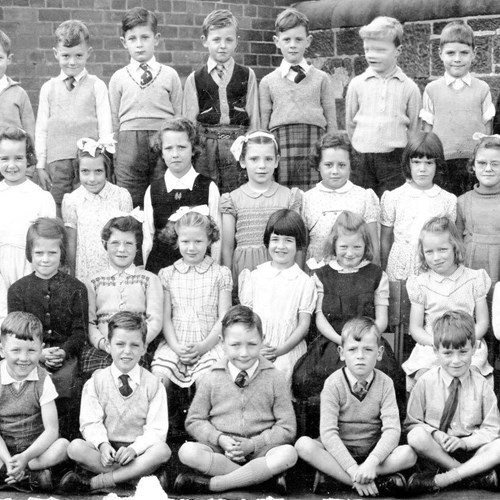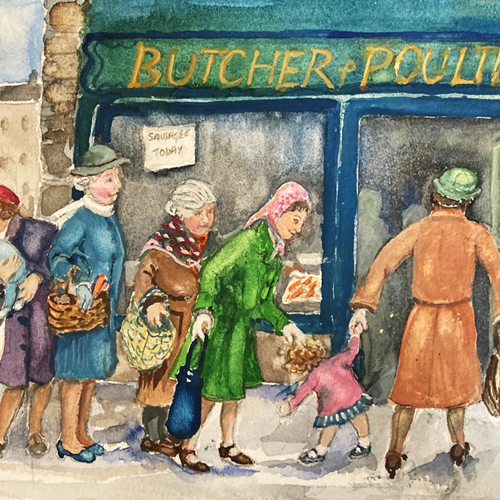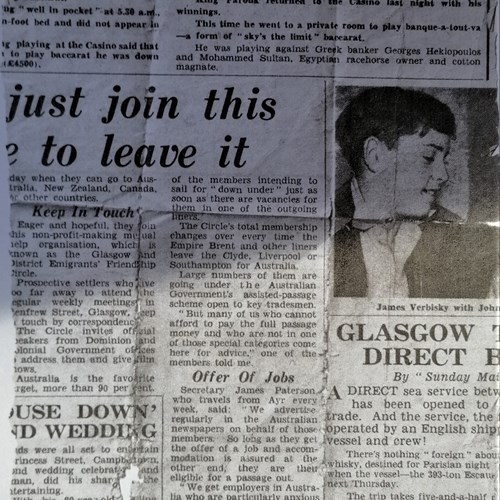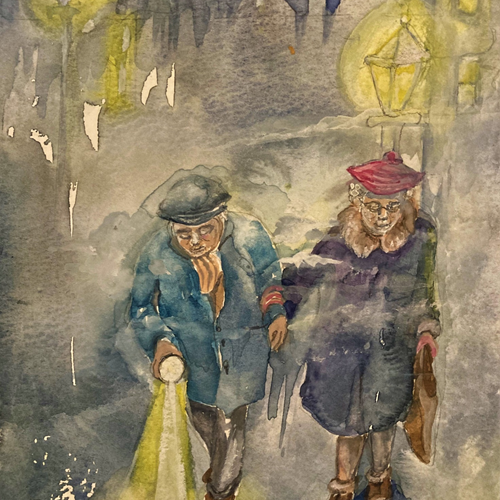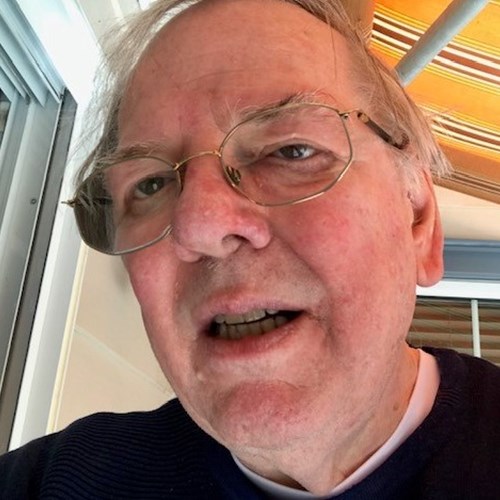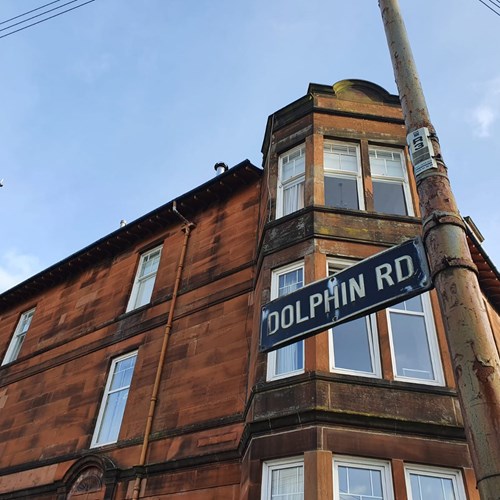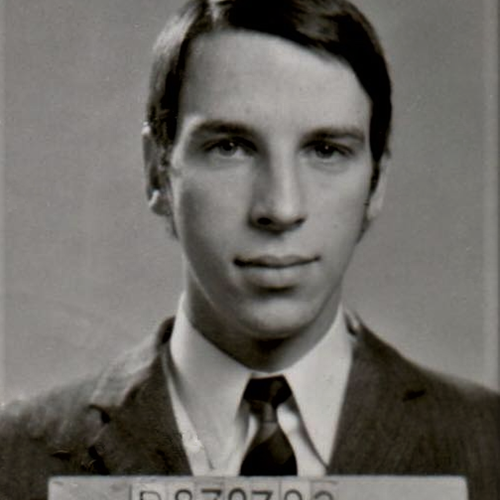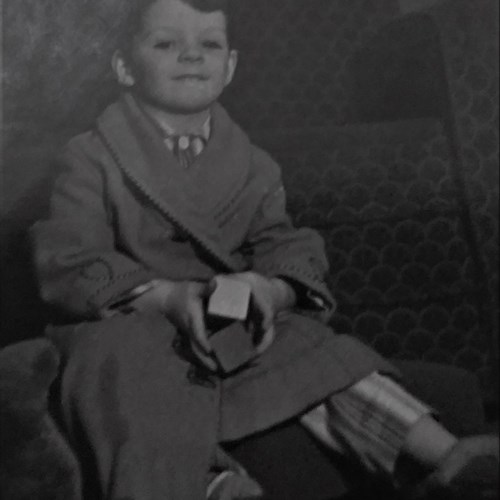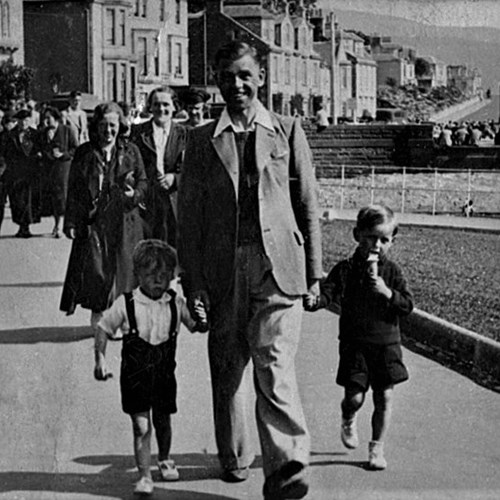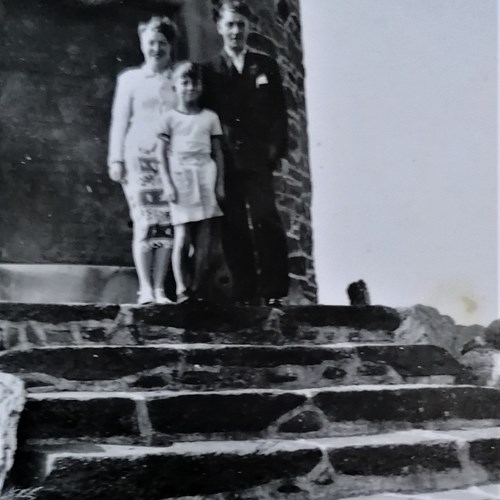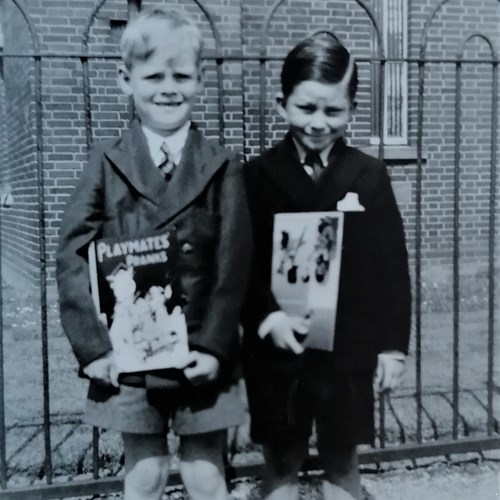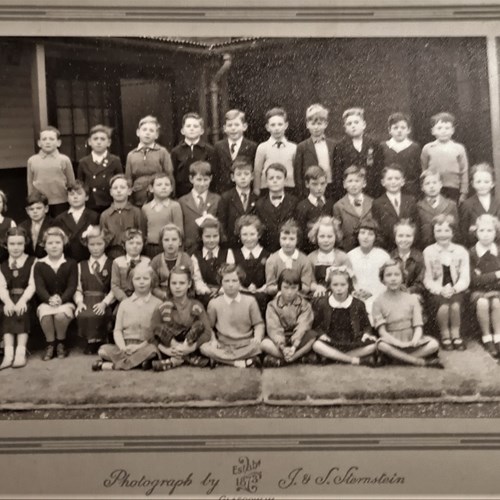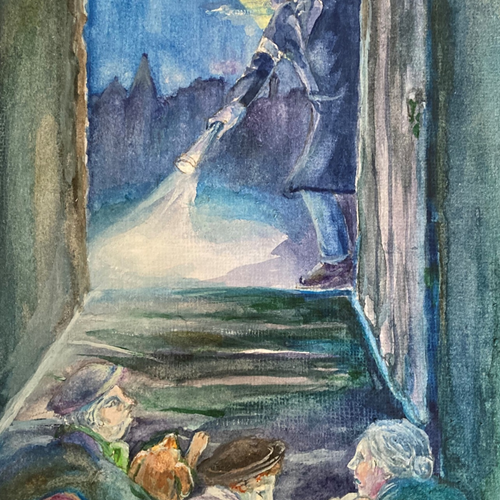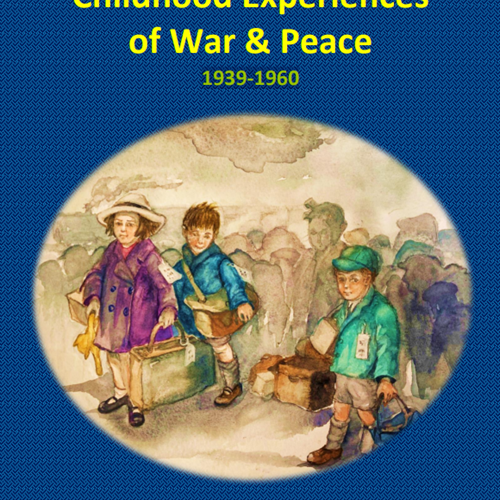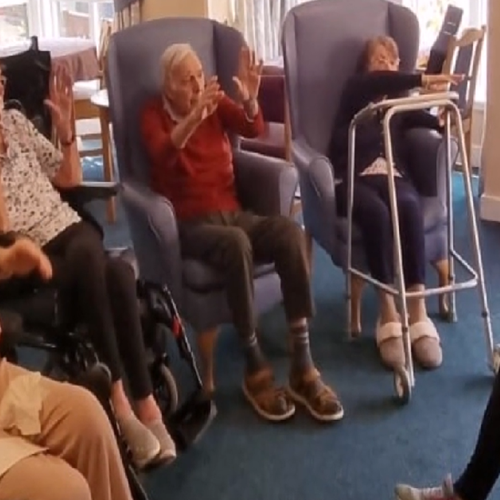We are used to images on film and television of the 1950s being the time of the rise of consumerism. A lot of these images come from our neighbours across the sea, in the USA, where the war had not had such a detrimental effect on the economy. In the UK, rationing of certain goods continued until July 1954. This included the rationing of clothes. We asked our respondents what kind of facilities they had in their homes in the late 1940s and the 1950s, and about their access to consumer goods in general. They told us that credit became more widely available from the mid-1950s, and the economy began to improve, as well as goods becoming more affordable
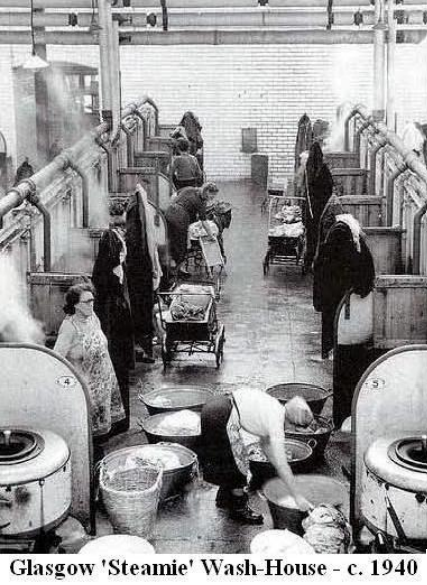
By the late 1950s, only a third of households in the UK had washing machines. They cost the equivalent of a month’s wages to most people. Most of our respondents did not have washing machines until the 1960s. There were a couple of exceptions where people lived in more affluent areas of the town. One respondent, who lived in the West End during the war, reported that his mother always had a top loader washing machine. However, a great deal of people still used the steamies attached to swimming baths, introduced to Central Scotland in 1866 when the first official wash-house opened on London Road. These were introduced to help combat disease by improving washing facilities for the public; during this period there were also wash-houses at the back of tenement buildings. Even when ownership of washing machines began to increase in the 1960s, many families still used the steamies, as large families meant that one washing machine was not practical for the job. As late as 1977 there were still nineteen steamies in Glasgow.
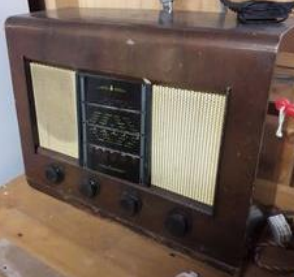
Bush wireless set owned by Robert Brown's father. He bought it after being sent home wounded from Italy in 1945. Robert and his wife still tune into the radio. He says it's seen better days but still has a nice clear tone. Courtesy of Robert Brown.
In Glasgow’s tenements, cookers were often still coal-fired ranges and many of our respondents have described these as been in their childhood homes. One respondent had a Rayburn (the Scottish Aga) when he lived in a posh part of the city. These were often gas-fired, although some were fuelled by coal. One respondent remembered his grandparents, who lived in Troon, having one gas ring and an old coal-fired grate used for cooking during the 1940s. Electric cookers although available for many years at that point, would have been very expensive to run. The picture is unclear regarding gas cookers, but their presence would have depended on whether there was a gas supply, and on affordability.
Coal fires were the main means of heating tenement flats and houses at the time, sometimes being linked to boiler systems for heating water. A great deal of our respondents mentioned getting deliveries from the coal man, and coal being stored in bunkers outside or in their homes. A couple of our respondents have talked about having to put coats on the bed at night to keep warm; this was before the introduction of the continental quilt or duvet. In one case, the garment used was their father’s great-coat from WWI.
Refrigerators were expensive and often considered to be luxury items rather than necessary kitchenware. Prefabricated homes came equipped with them, though one respondent has mentioned that the fridge in his childhood prefab was more like a cool box. Other people recall having refrigerators in the early 1950s, and not all were from particularly affluent areas. We have heard from respondents who bought refrigerators for their parents when they became wage-earners. One respondent’s mum had told her that she felt a refrigerator was more important than a washing machine, which might have been because alternative washing facilities were available at the time, in the form of steamies. For most people, though, fresh food had to be bought on the same day that it was to be consumed, with people keeping milk and dairy on the windowsill to keep cool. Larders with cool air-vents were built into some dwellings.
Radios, or wirelesses as they were known at the time, were present in many homes during this era, and we have heard a number of tales of people’s favourite radio programmes. We have heard from one respondent who still uses the Bush radio his father bought in 1945, after being sent home wounded from Italy that year. He said it has seen better days but still has a nice clear tone.
In the UK, television ownership was numbered at fifteen thousand in 1947, with a rise to three million by 1954. This was possibly partly due to the popularity of people watching the coronation of Elizabeth II on the television in 1953. We have heard stories of respondents watching the event at relatives and neighbours’ houses. One respondent reported that the coronation was quite monotonous for children, as it went on for hours, but that the celebrations that went along with it were good fun. Others have told us that their family had no interest in the event. The early part of the 1950s have been described as the radio years, and the later part as the TV years. There were thirteen million TVs in British homes by 1964.
Cars were a rarity during the early post-war period and one out of every three vehicles was a public transport vehicle. We have heard many stories of people travelling about Glasgow and surrounding area on trams, trains, buses and steam boats. However, car sales were increased by the end of petrol rationing, and the first motorway opened in 1958. Only a couple of our respondents had cars during this time.
The general picture regarding household goods that we take for granted today seems to be that most households in the Glasgow area were not equipped with all of these until the 1960s, and in some cases the 1970s and later.
Childhood Memories
“Consumerism”
I bought my Mum a fridge as a surprise. She came in one afternoon and there was a fridge sitting. She always said she would rather have a fridge than a washing machine. She felt it was more important having a fridge.
Grace Wilson Blair, born 1935, brought up in Shotts
My Dad won a competition in the Sunday Mail and got T.V. set and a radiogram at a different point.” “We went through to my Uncle in Cowdenbeath and watched it there (The Coronation). A lounge full of people. I remember it well; we didn’t have a T.V. until after that.
Grace Wilson Blair, born 1935, brought up in Shotts
I actually don’t think…I don’t think my mum had a washing machine until they went into sheltered housing. That’s the first time I recall…They didn’t have one in Campbell Street because there was no room for it. There was nowhere in the…you could have had a twin tub and had hoses over the sink. But no, we never had a television till I was twelve. That was one of the other unusual things. Everybody else had a television. Because I remember going to an upstairs neighbour’s to watch the Queen’s Coronation. And, it was…the television screen was no bigger than the laptop screen and it was in this huge wooden cabinet.
But no there was no…we didn’t have a washing machine. And again, if you don’t know about these things or you’ve never experienced having one. You actually don’t miss it. I mean people hung their washing out in the back court. And each building…each house on the landing. There were metal hooks. And each person had their own clothes line. And heaven forbid that you used anybody else’s line. But they were very good. If neighbours…if they’d done a big bedding wash and they needed to hang out some sheets…you would let someone else use your clothes line if they had bedclothes to dray. So, it was…It was all very neighbourly in that respect.
Heather Bovell, born 1948, brought up in Gilsochill, Maryhill
He also built me a dolls’ house when I was small. You couldn’t really get toys, but he made a dolls’ house. My Dad made all the furniture for it and my Mum put all the velvet covers on the settee and chairs and made curtains. My Father rough casted the front and actually I had more fun watching him making the dolls' house than when it was finished. All my friends always wanted in to play with this wonderful dolls’ house. It was so realistic that the manager of the local joiner’s shop asked if he could put it in the window on display to advertise the tools that he sold. And he was inundated with people coming in saying ‘can I have a raffle ticket for the doll’s house.’ And he had to say it wasn’t in a raffle. It was just to advertise the tools they had.
Grace Wilson Blair, born 1935, brought up in Shotts
Chicken was a treat. A roast chicken was maybe about four or five times a year. That was a luxury, a chicken at Christmas time. My Mother used to make tripe, I liked it as well. Liver, mince or as we used to call it Glasgow Caviar. I used to eat anything, Steak pie, anything like that. In those days nobody had fridges and your Mother had to go every day to get her shopping, her messages, and you never had room in the house either, there were no fancy kitchens. You had a big press in the living room. It was just another door in the living room and when you opened it, it never went anywhere, it was just about six inches deep with a couple of shelves. And that was for your tins of beans, or a tin of soup or something and just your day-to-day items. And under the sink you could put your tatties and that in. There were no kitchen units or anything like that. I suppose it was quite frugal when you look back on it. We never had anything but see, nobody else had anything either, so we were all the same, we never knew any different.
Sandy Boyle, born 1948, brought up Maryhill
I think I was about 16 when we got a television which was fairly late. My Mother thought it would interfere with my homework. Which it did but of course. Other people had televisions. People got televisions for the Coronation. My Grandmother lived in Kingsway not far away from us. And the day of the Coronation one person had got a television for the Coronation and everybody, everybody from every house in Kingsway was packed into their living room to watch the Coronation on this tiny screen. One boy in Wykeham Place had a television very early. He was very popular because you’d go round there and ask: “Is George coming out to play?” “No, he’s watching Andy Pandy.” “Can I come in and watch Andy Pandy too?” (Laughs)
So of course, every kid in the street was in George’s house watching Andy Pandy and various other things.
Other neighbours of my Grandmother had televisions and their windows were quite close to the street, so when we were out playing in the summer we used to go and look in the window of this neighbour. She used to sit with her back to the window while she was watching the T.V. and it was quite loud. She was probably a little bit deaf. So, we could all stand and look through the window and watch her television.
Marlene Barrie, born 1946, brought up in Scotstounhill and Blairdardie
I remember during the war you kept everything thing. You had clothes and you didn’t throw anything out. And when wrapping paper at Christmas would be kept from one year to the next so... and string, things like that. Nothing was wasted, that’s for sure.
Hugh Livingston, born 1940, brought up in Hyndland and Fintry
I built radios. I had a crystal set. I was probably ten or eleven. And I learned and understood that in order to get reception from a crystal set you had to have an antenna and a very good ground and headphones. Because all it was, was a cat’s whisker. The only place where I could get a good ground was in the bathroom sitting on the toilet. So, I used to spend a lot of time sitting on the toilet listening to the light programme with my headphones on. So quite often there would be people banging on the door wanting me to get out of there. Eventually my Dad went down to the Barras one Sunday afternoon, as was his habit quite often, and he brought home a real radio which I was very excited about. And that was mid to late ‘50s, because I locked on to Radio Luxembourg which was a popular radio station for teenagers at the time. The reception was pretty bad and I can remember realising one time that to get the better signal you had to have a good ground. But on the table beside my bed there was no ground on this set and so I rigged one up. I got a bunch of wire and I went into the bathroom and I tied it to the cold-water pipe under the sink. And I ran it across the hallway under the carpet into my bedroom. And I had one end of the wire in my right hand and I had a nut on the back of the chassis of this radio on my left. And as I touched the two of them, I shot across the bed and ended up against the wall, my hands were bleeding. The reason was that it was what was known as a live chassis radio so you had 250 volts and it came across me and I got the fright of my life. I didn’t tell anybody mind you, but it was a stupid thing to do but there again, I was learning. It nearly did me in, but I was learning.
Ian Coombe, born 1942, brought up Gosport, then Glasgow
We had a radio and got a television when I was ten. A huge, enormous thing with a tiny wee screen that wasn’t any bigger than an iPad. But it was as big as a cooker, big valves, and I remember having to stand holding the aerial, round a bit, left a bit, over a bit, no no no, go round, and back a bit. Nobody could get up in the loft for an aerial. These aerials tied on to the windowsill and stuff like that. It was just a black and white picture and one station.
You used to get Wells Fargo, Lash Laroo, The Lone Ranger, The Range Rider, Wagon Train, all black and white cowboy things, they were fantastic. I used to love all them. There were cartoons but you never got much. You had Bill & Ben the Flowerpot Men, Muffin the Mule and Pinky & Perky. They were all that phoney because you could see the strings. But the cowboy things were good.
Sandy Boyle, born 1948, brought up Maryhill
There was no room for anything like that in the single end. My Mother used to go to the Steamie or she would take it up to a place called ‘The Bagwash’. You put all your stuff in a pillow case and you take it up to this laundrette at the top of Maryhill Road and they’d weigh it and then tell you how much it cost to wash it all. And when you got it back it was always damp. So, you’d get it back and hang it out on the washing line out the backcourt.
The Steamie was in Maryhill Swimming Baths the public baths in Gairbraid Avenue. The Steamie and the swimming were in Maryhill Baths.
Sandy Boyle, born 1948, brought up Maryhill
My brother Heimy must’ve been after he qualified as a pharmacist. Bought my Mother a Frigidaire fridge and sometime after that a television. I grew up with no television, it was radios and on a Saturday night huddled round the radio.
Philip Cohen, born 1937, brought up in the Gorbals and then Shawlands
There were such amazing shops in Glasgow, big posh stores - Copeland and Lye, Pettigrew & Stephens, Trerons, Forsyths - all plush big department stores. In Forsyths I got my school uniform from there, made to measure, I remember that.
Helen Jean Millar, born 1931, brought up Pollokshields
At that time, it was very hard to make phone calls. At Christmas time you had to order them so that you got a line for it and it was like three dollars to even get on the phone and three dollars a minute or something like that. And so you couldn’t talk very long. It would’ve been wonderful if we had the things we have today. It was hard to keep in touch. It was letters that was about it and a few phone calls. Then it got better as the years went on of course. When my Mum and Dad were alive, it was a recording box. We had a real recording box, not like press the button like we do here.
(Winifred) Margaret Baker Davidson, born 1937, brought up in Glasgow and Fintry
Married women, like my Mother were housewives and my Father did not expect my Mother to go to work. Being a housewife was difficult during and after the War. There we had no labour-saving devices apart from a vacuum cleaner. We had no hot water in the house until a few years post-War when my Father installed a Geyser. My Mother’s wash day was Monday morning and a fire had to be lit under a large boiler into which the clothes went to be stirred and mashed with a wooden pole. They were then put through a mangle and hung out to dry in the backcourt if dry and on the pulley inside if wet. No electric irons the iron was heated at the fire. Baths were taken in a zinc tub in front of the fire with kettles used to heat water. Toast was made by holding bread in front of the fire on a toasting fork. Due to shortages during the War my Mother spent a lot of time baking.
Jim Smart, born 1938, brought up in Glasgow and Milngavie
The only reason I remember this was I was always a big football fan and it was in the 1950s and it was The Coronation Cup they called it, a cup for the football. And somebody said ‘Oh, so and so’s uncle’s got a television so we’ll try and get up to see it,’ but I never got up to see it. I think the first television really that I saw myself was black and white. We were too young, we were always out and about. In my time it was short bursts of programmes like a wee news program and later on it would be the highland dancers and that. Scottish Television was just in its infancy then.
James McLaughlin, born 1939, brought up in Clydebank and Rothesay
My Mother had a washing machine with a wringer and when I look back on it, it was the same water that was in the washing machine. You did your whole washing in the machine. You’d take out your stuff, put it through the wringer and we were always told to stay away from that wringer because it was electric. But no dryer.
We had a telephone. We had the lines where there were several people on it and you sometimes had someone on the line and you’d pick it up and they were speaking. So, you couldn’t use it at that time.
(Winifred) Margaret Baker Davidson, born 1937, brought up in Glasgow and Fintry
I don’t know how my mother did the washing. I think it would be in the sink in the kitchen. But it must have been a huge task with three children and a husband and all this sort of stuff. They had a mangle of some sort. You know…They would stick that under the sink. Then they would bring it out and attach it somewhere or other. Then they would mangle the clothes. They had a real rough time women, I think, in those days.
And then my father…I think about 1956 or 1957 or thereabouts we got a television set. I know there was a lot of snow on it. You gave it a bang. The snow went away. You know. That type of thing.
And I know we had a telephone. And the telephone was not for phoning your pals. The telephone was for emergencies. Fire, ambulance, police. That was it. There was no, like today, casual chit chat over the line and all that sort of stuff.
Peter McNaughton, born 1944, brought up in Clapham, Glasgow and Comrie
My Dad brought back a wind-up gramophone from WW2. The irony is he bought it in Camden, New Jersey, which is about 10 or 12 miles away from where I’m sitting right now. The Victrola Factory is there. The building survived but the factory is long gone. They preserved the building. In WW2 he certainly sailed into Philadelphia and he bought records and stuff there and so the irony is I’m back where that gramophone came from.
Yeah, that was one of the things we did. We’d wind up the gramophone and play Glen Miller and Artie Shaw and some classical and it was interesting. I wish I had that gramophone today.
Murdo Morrison, born 1950, brought in up Scotstoun and Drumchapel
Well we bought stuff on HP like the television. Everybody had to get a television and doing the likes of that and washing machines/fridges. Because I am of the opinion, come the ‘60s I’d say the U.K., not just Glasgow started to get a wee bit disposable income. And were able to buy these things and foreign holidays and a car. I mind my older sister, her husband, he had a wee mini, they were just wee boxes on wheels, just a tin box. But it was transportation, getting you from A to B. I would say everybody did the H.P.
Alf Duffy, born 1940, brought up in the Gorbals and Pollok
My Father purchased an old Vauxhall car and we drove to Callander sometimes to visit old friends of his. I often sat on my mother’s knee during these trips. Callander was about 30/35 miles away. This car was of an age that it had a temperature gauge on the bonnet. I can remember my father in a rage running out to the gauge and taking it off whereupon he got scalded in a rush of rust red water and boy did I laugh. That laughter was of very short duration as my dad had a pretty short fuse!
Colin Stevenson, born 1944, brought up Hillhead and Jordanhill, Glasgow
I was not so much aware of happenings during the War apart from the latter stages D-Day onwards. From around 1943 when I started school I started to listen to the news with my Mother and Father. The War completely dominated the News to such an extent that, at the end of the War, I asked my Father if that meant there would be no more news.
Following the War, a series of glossy magazines, most with War pictures relating to various actions, were published many of which I read. They also contained first and accounts by the participants. I also joined Partick Library in 1946 and have read much about the War ever since and still take an interest in TV shows or Films about the War.”
Jim Smart, born 1938, brought up in Glasgow and Milngavie
This period took in the death of King George 6th and India’s independence. I can remember listening reverently to the King’s speech on the radio on Christmas day. I can also remember Princess Elizabeth visiting Glasgow and my father giving me a little Lion Rampant flag to shake at her car. At her Coronation we all got a tin of sweets to commemorate the occasion.
Colin Stevenson, born 1944, brought up Hillhead and Jordanhill, Glasgow
In those days there were a lot of small shops. In Drumchapel we had a row of shops not far away, certainly within walking distance. We had an R.S. McColl, I don’t know if they exist anymore; kind of like combined newsagents/sweetie shop/tobacconist. We had bakeries. We had small grocery stores. And then later on in the ‘60s they built a shopping mall in Drumchapel. But yeah, you had stores close by, even in Scotstoun. The thing I miss which is long gone now, is the old-fashioned sweetie stores. You know, the candy stores, where you would go in and they would have these big jars and you would ask for a quarter pound of something and they’d take a little paper bag and they’d scoop it in, weigh it and then they’d twirl the bag so it had a couple of ears and hand it to you.
A lot of stuff came in bulk in those days, even into the late ’50s and ‘60s. Like up in Anniesland there were a whole bunch of shops. My Grandparents lived in Anniesland and so we’d often visit theirs especially in the summer when school was out and they had greengrocers and when you went in, in those days, when you wanted potatoes, they were in a big bin and they would weigh them out and tip them into your message bag. If you needed cheese it came in rounds. Those people had it down to a fine art, they could guestimate what a half pound of cheese was just by eye. And they had these cheese cutters like two handles with wire and they’d weigh it and they’d wrap it.
Glasgow stayed basically like the ‘40s until well into the 1960s and it was only in the 1960s that things started to change. When you started to get supermarkets and pre-packaged food. In the old days you’d go down to the butchers and there would be sawdust on the floor and you would ask for sausages and they’d do their own butchering in the back, you know, it was that kind of world.
The one thing I do want to talk about is the wonderful ice cream and fish and chip shops that we used to have. In Anniesland near the canal was an Italian owned Ice cream shop called Valenti’s. And they made their own ice cream and the other place that made their ice cream was The Milk Marketing Board, they had such fantastic ice cream. But Valenti’s you would go in there and they’d have things like they called them oysters and they had nougats, wafers, ninety-nines with a Cadbury's flake and raspberry syrup.
Murdo Morrison, born 1950, brought in up Scotstoun and Drumchapel
I remember as a wee boy playing outside the Steamie. And I remember my Mother would be in one stall and my Granny would be in the other doing the washing. And they had what they called big clothes horses where you hung the clothes to dry. I remember all that in the Steamie.
You’d see women either with their washing in the pram or else they had big bundles on their back walking to and from the Steamie. Where we were the Steamie was about half a mile away.
Alf Duffy, born 1940, brought up in the Gorbals and Pollok
We had a television. I think we must’ve got it after the Coronation. I can remember a black and white television and washing machines. I think we got a single one or a twin tub and of course because there was so many of us. I think my Mother had one. I can remember I had a twin tub too when I came here (Fife) at first. I can’t remember my Mother having a fridge.
Marion Penny, born 1940, brought up in Townhead and Ruchazie
We didn’t get a television until I was about twelve in the late ‘40s. We didn’t get a television for a long time. My Father was very slow to accept it. He was very concerned about putting all that money out and having it break down. And then they got into this thing where you rented them. You would rent your TV. And if it broke down you could take it back. I remember it was the day that King George died. I remember looking in a store window in Dumbarton and it showed some of his funeral, we didn’t have a TV. then. Definitely not coloured, for a long time after that.
Rene Walters (nee Catherine McMenamin), born 1938, brought up in Dumbarton
Obviously, a car and a television. The Coronation of 1953 there was a neighbour who had got a T.V. in. And there was a big house gathering and that’s when I said we went out to play cricket because we got fed up watching the television.
There were things like Kenwood Mixers. My Mother always had a washing machine it was a Thor, it was a top-loader, not a twin tub. It did the full thing. Gas cookers were there. I remember we had a wash-house, a toilet and a maid’s room. And that was knocked out to extend it and make it a kitchen. And then we had a breakfast room. We got a Rayburn, the Scot’s equivalent of an Aga, and after we got that, the breakfasts were bacon and egg most mornings rather than the porridge.
The house that we had, had bars on the windows at the back and I remember my Father sawing these off. It had been a blind organist that had had the house before and there was blood red walls and the dark wood my Father stripped down and it was back to the light wood.
Kenneth MacAldowie, born 1944, brought up in Aberdeen and Glasgow
I do remember people had a bit more money, because there was nothing to spend it on. You needed coupons for furniture. You needed coupons for clothing. Coupons for food. So people had a bit more money. Not because they were earning more, but because they couldn’t spend it then.
Elma Robertson, born 1936, brought up Old Kilpatrick
I remember the radio being on then (when they moved to a place on their own) because my Mum used to turn it up so that she wouldn’t be late for her work and if it wasn’t transmitting and she would turn it up full volume. And when it did start to transmit there was this piercing noise coming through and that was time to get up for her work. But before that I wasn’t aware of a radio.
James McLaughlin, born 1939, brought up in Clydebank and Rothesay
I suppose it must have been because we didn’t have to use clothing coupons to buy a new dress. And a time when I got a suit, a skirt and a jacket and a great school friend got the same one, exactly the same. I still remember that.
I can remember my Father getting a car as he’d given up his car during the war and that was nice. And as I said, buying a big expensive house rather than living in a rented tenement flat.
Helen Jean Millar, born 1931, brought up Pollokshields
